Janey and I were traveling aimlessly through the beautiful state of Oregon, taking turns at the wheel of my 1964 VW bus.
It was August 8, 1974, and we were headed for Crater Lake when we heard the news on the radio — Nixon was set to deliver an important speech. The Watergate affair had been occupying the top spot on the evening news for months, but we had been out of the loop for a week or more, so we didn’t know for sure what almost everyone else in the country knew: that Nixon was being forced out of office.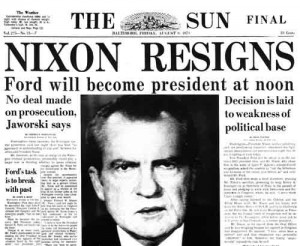
It’s difficult to describe the impact Richard Nixon had on my generation. He was every bit as important as President Kennedy, the earnest, slightly creepy A/V Club guy to Kennedy’s dashing frat boy. And even though we know that politics ain’t beanbag, Nixon found ways to reduce it to its most brutal elements, and he was good at it. He lost some Big Ones, but he won more than he lost. Elected for the first time just a few months before I was born, and stretching all the way through to just before my 25th birthday, Nixon haunted the hallways of our lives, in his dark blue suit and his five o’clock shadow, never looking straight at us, always seeming to harbor some hidden motive.
He had gone from Congress to Eisenhower’s Vice President in 1952, but after his first term in the number two job, the Republican Party wanted him gone, and, under pressure to leave Ike’s ticket in 1956, he went on television and gave the famous Checker’s speech, saving his job and surprising the political old hands of the day. Again, I thought he was finished after he lost the 1960 presidential election to JFK, who apparently had learned from Nixon himself the power of TV. Silly me. Two years later Nixon was back making a credible run for Pat Brown’s job as governor of California. In his concession speech it seemed that even Nixon himself figured his career was over, telling the press that they “wouldn’t have Dick Nixon to kick around” anymore.
But then came Dallas, and LBJ, and later LBJ’s decision not to run for reelection in 1968. Rested and fit, Nixon was back, and this time he won all the marbles. He was like a zombie that we just couldn’t kill, no matter how many times we didn’t vote for him.
Up to this point he was only a political opponent with whom I strongly disagreed. And disagreeable it was to have him in the White House, even if he did open relations with China and authorize the creation of the EPA. But once he got the top job, something must have changed in Nixon. Maybe it was simply the feeling that he had nothing more to strive for, or maybe he really was crazy all along, but by the time of the 1972 election he had become delusional, paranoid and criminal. He won that election, but he had begun to disintegrate psychologically.
His presidency was unraveling. He was caught sending burglars to break into Democratic headquarters at the Watergate Hotel, keeping an “enemies list” of journalists, and authorizing “hush money” to keep witnesses quiet. And he was tape recording the whole thing, keeping an audio record for future prosecutors. During the two years after his second inaugural he was revealed as the dirty Tricky Dick we all remember. Not some weasel-assed nobody like Grover Norquist, but the President of the United States! It was appalling.
Janey and I got to some lodge on Crater Lake that afternoon. The grounds appeared deserted, but when we went into the bar, there were hundreds of people crowded in, watching the television. I have never seen such rapt attention to any political speech before or since. It was as if we were holding our collective breath. Only a week before, under order from the Supreme Court, Nixon had been forced to release his secretly recorded tapes. Tip O’Neill had told reporters that the House Judiciary Committee was going to vote — Democrats and Republicans alike — to impeach the President. Nixon was cornered, and I’m not proud today to say that I enjoyed seeing the rat trapped as he was.
Nixon made a dignified speech, not exactly beating around the bush, but stalling and offering excuses for a while before he got to point, which of course was that he was “not a quitter,” but he was quitting. He took no responsibility for what was happening to him. There was no way he could have stayed in office, but sometimes I wonder what the world would be like if he had apologized, admitted his wrongdoing, and left the world stage quietly. Would Republicans still feel they had to find a way to impeach Clinton and Obama?
Either way, Janey and I shared a long kiss, and soon — very soon, actually — we forgot all about Richard Nixon. But he’s still with us, in ways few historical figures can ever be. Many of us who lived through the Nixon years, what Gerald Ford would call “our long national nightmare,” wake up occasionally in a cold sweat, as an imagined footfall sounds just outside a door, and it takes a moment to remember — he’s is not coming back.






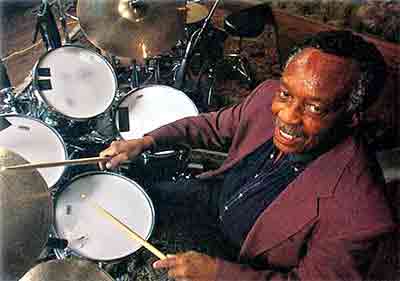

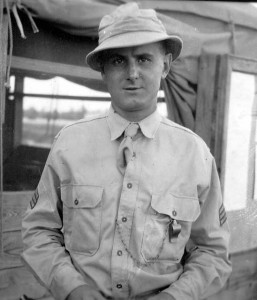 enough to ask the important questions, let alone understand the answers. A lot of what I think I know is pieced together from things he told me, or things I heard from others.
enough to ask the important questions, let alone understand the answers. A lot of what I think I know is pieced together from things he told me, or things I heard from others.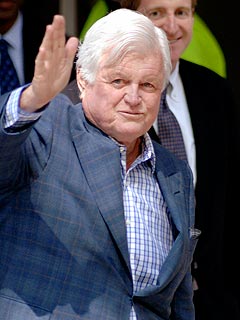
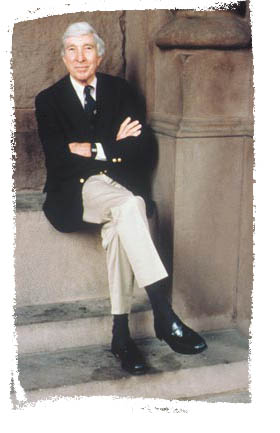 For at least a decade I was lost in Updike’s books. He wrote about love, God, human need and greed, about how Life happens when you are busy doing something else. He won two Pullitzer prizes, but he didn’t let that stop him from writing more good books.
For at least a decade I was lost in Updike’s books. He wrote about love, God, human need and greed, about how Life happens when you are busy doing something else. He won two Pullitzer prizes, but he didn’t let that stop him from writing more good books.